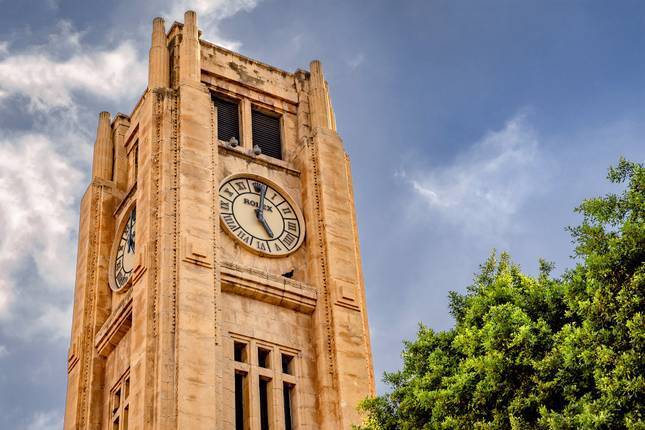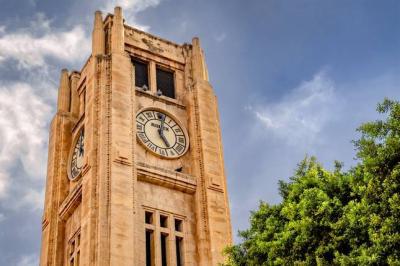The year 2022 has closed its pages, but it has not concluded its chapters derived from previous years in the Lebanese vortex, which mandates coexistence according to political realities alongside internal sectarian and confessional conflicts, as well as regional and international struggles; coexistence with corruption and its legitimization, with civil wars, and with mandates and appeals from the international community to impose its grand mandate instead of the smaller ones. The features of 2023 will be drawn in the ink of the years that preceded it, so it is essential to identify key anticipated milestones rather than merely recounting the course of the significant events that the country experienced in the past year.
### Between Exploration and Normalization
The year 2022 witnessed numerous changes, the most prominent of which was the maritime border demarcation file in the southern region, which Lebanon described as an achievement. However, so far, there have been no signs of investment in it. While Total was supposed to commence exploration operations at the beginning of the new year, a delay has occurred, pending next spring. The demarcation file constitutes a critical point regarding the essence of Lebanon's political direction. Will it actually embark on the normalization train that has started in the region, but this time through oil and gas and in an indirect manner? Or will Israel benefit from the demarcation in terms of exploration, extraction, and export while the Lebanese await greater transformations? This question remains central, and regional and international developments must provide answers to it, but the path to an answer will be lengthy due to the lack of attention to the small country following the achievement of the demarcation.
### The Long Void
Politically, Lebanon has once again entered a presidential vacuum, which seems likely to continue for a long time despite the ongoing internal and external movements. So far, these efforts remain exploratory and unclear, especially amid the engagement of countries with larger and more significant issues. On the level of Lebanese details, the end of the past year witnessed a broad disagreement between Hezbollah and the Free Patriotic Movement (FPM), a dispute with multiple reasons, primarily the presidential elections and FPM leader Gibran Bassil's refusal to endorse the nomination of Suleiman Frangieh, alongside his endeavor to lift U.S. sanctions against him and his political movement focused on meeting and engaging with various forces, including searching for Sunni allies or at least minimal understanding. Bassil seems to be trying to diversify his options for appeasement with the Druze and seek understandings within the Christian arena, alongside reviving relationships with the Sunni community, evident from his attempts to reach a consensus with Prime Minister Najib Mikati despite the significant disagreement, as seen in his recent visit to Sidon and his meetings with Bahai Hariri, Osama Saad, and Abdurrahman al-Bizri. These visits and meetings carry essential symbolism, particularly as they come after businessman Ala'a Khawaja's facilitation of a meeting between him and Suleiman Frangieh. It is known that Ala'a Khawaja was a key figure in the alliance and investment relationship between Bassil and Saad Hariri, and Bassil's questions about Hariri and the possibility of his return have not gone unnoticed. This matter drives others to believe that Bassil is attempting to weave relationships and alliances with other sects to tell the Shiite duo that he is capable of moving and that they must accommodate him to avoid him drifting away.
### Bkerke Moves
This path will continue into the new year, alongside the evolving positions of Maronite Patriarch Bechara Boutros al-Rahi regarding the call for a special international conference on Lebanon. Observing sources indicate that al-Rahi will work to intensify his movement in the upcoming phase, as he meets numerous personalities and forces, seeking to unify ranks and fronts to exert political influence on both internal and external tracks. He has expressed to his visitors that their state of political weakness is what makes others stronger, referring to Hezbollah. In this context, sources state that next week will witness multiple meetings at the patriarchal edifice in Bkerke, some of which will discuss operational political papers and ideas aiming to convince the patriarchate to sponsor a national dialogue, not just a Christian-Christian dialogue. If conducive conditions do not materialize, there will be a proposal for a fundamental idea: a meeting of some politically aligned figures around similar ideas, sponsored by the patriarch to enhance their power and presence in the political sphere.
### Waiting for Godot in Reform
Accordingly, in light of the ongoing presidential vacancy, Lebanon will face two options, with no third alternative. The first option is to succeed in reaching an internal settlement leading to the election of a president and the formation of a government within the minimum boundaries of internal compromise and regional sponsorship, as occurred in the formation of governments following the October 17 Revolution. Consequently, there will not be any change in the trajectory nor any improvement or development. The second option entails the probability of prolonging the vacancy and a lack of genuine external attention to Lebanon, signifying the continuation of collapse to its ends. This means coexisting once again with void and collapse and corruption for an extended period, awaiting the emergence of external and internal elements that lead to achieving real reform.




